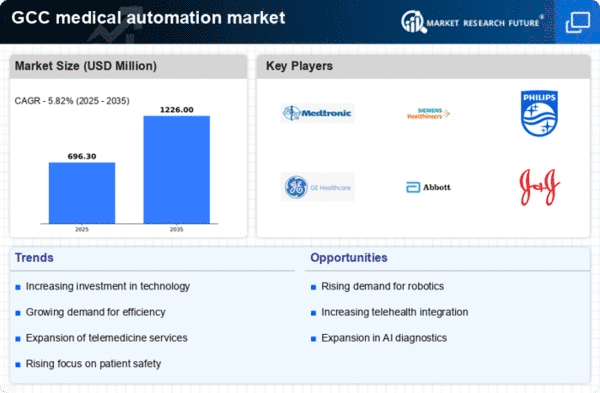Rising Demand for Efficiency
The medical automation market is experiencing a notable surge in demand for efficiency within healthcare systems across the GCC. As healthcare providers strive to enhance operational workflows, automation technologies are increasingly being adopted to streamline processes. This shift is driven by the need to reduce human error and improve patient outcomes. According to recent data, the automation of routine tasks can lead to a reduction in operational costs by up to 30%. Consequently, healthcare facilities are investing in automated solutions, which are expected to contribute to a projected market growth of approximately 15% annually in the region. This trend indicates a strong inclination towards integrating automation to achieve higher efficiency in medical practices.
Shift Towards Value-Based Care
The shift towards value-based care is reshaping the medical automation market landscape. Healthcare providers in the GCC are increasingly focusing on delivering high-quality care while managing costs effectively. This paradigm shift necessitates the adoption of automation technologies that can provide data analytics and performance metrics. By leveraging automated systems, healthcare organizations can track patient outcomes and optimize resource allocation. It is estimated that the implementation of value-based care models could lead to a 10% reduction in healthcare expenditures. As a result, the medical automation market is likely to see a rise in demand for solutions that support this transition, ultimately enhancing patient care and operational efficiency.
Increased Focus on Patient Safety
An increased focus on patient safety is emerging as a critical driver for the medical automation market. Healthcare institutions in the GCC are prioritizing the implementation of automated systems to minimize risks associated with manual processes. Automation technologies, such as electronic health records and medication dispensing systems, are being adopted to enhance accuracy and reduce the likelihood of errors. Reports indicate that hospitals utilizing automated systems have seen a 25% decrease in medication errors. This emphasis on safety not only improves patient trust but also aligns with regulatory standards, further propelling the growth of the medical automation market in the region.
Technological Advancements in Robotics
Technological advancements in robotics are significantly influencing the medical automation market. The introduction of sophisticated robotic systems for surgical procedures and patient care is transforming the landscape of healthcare in the GCC. These innovations not only enhance precision but also reduce recovery times for patients. The market for robotic-assisted surgeries is anticipated to grow at a CAGR of 20% over the next five years. Furthermore, the integration of robotics in rehabilitation and elderly care is gaining traction, as it offers improved quality of life for patients. This evolution in robotics is likely to drive further investments in the medical automation market, as healthcare providers seek to leverage these technologies for better patient management.
Growing Investment in Healthcare Infrastructure
Growing investment in healthcare infrastructure across the GCC is significantly impacting the medical automation market. Governments and private entities are channeling substantial funds into modernizing healthcare facilities, which includes the integration of automation technologies. This investment is aimed at enhancing service delivery and meeting the rising demand for healthcare services. For instance, the GCC countries are expected to allocate over $50 billion towards healthcare infrastructure by 2027. Such financial commitments are likely to facilitate the adoption of advanced medical automation solutions, thereby fostering market growth and improving overall healthcare quality in the region.
















